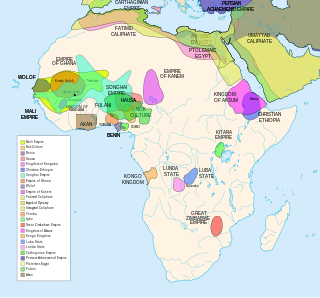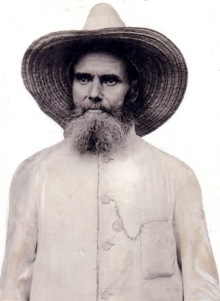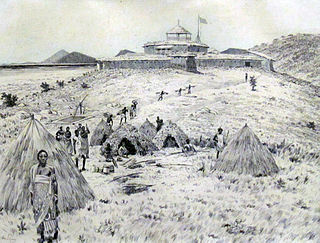
Leopold II was the second King of the Belgians from 1865 to 1909, and the founder and sole owner of the Congo Free State from 1885 to 1908.

The Congo Free State, also known as the Independent State of the Congo, was a large state and absolute monarchy in Central Africa from 1885 to 1908. It was privately owned by King Leopold II, the constitutional monarch of the Kingdom of Belgium. In legal terms, the two separate nations were in a personal union. The Congo Free State was not a part of, nor did it belong to Belgium. Leopold was able to seize the region by convincing other European states at the Berlin Conference on Africa that he was involved in humanitarian and philanthropic work and would not tax trade. Via the International Association of the Congo, he was able to lay claim to most of the Congo Basin. On 29 May 1885, after the closure of the Berlin Conference, the king announced that he planned to name his possessions "the Congo Free State", an appellation which was not yet used at the Berlin Conference and which officially replaced "International Association of the Congo" on 1 August 1885. The Free State was privately controlled by Leopold from Brussels; he never visited it.

The Scramble for Africa was the invasion and colonisation of most of Africa by seven Western European powers driven by the Second Industrial Revolution during the era of "New Imperialism" (1833–1914). In 1870, 10% of the continent was formally under European control. By 1914, this figure had risen to almost 90%, with only Liberia and Ethiopia retaining their full sovereignty.

The Berlin Conference of 1884–1885 met on 15 November 1884 and, after an adjournment, concluded on 26 February 1885 with the signature of a General Act regulating European colonization and trade in Africa during the New Imperialism period.

The Royal Museum for Central Africa (RMCA), communicating under the name AfricaMuseum since 2018, is an ethnography and natural history museum situated in Tervuren in Flemish Brabant, Belgium, just outside Brussels. It was originally built to showcase King Leopold II's Congo Free State in the International Exposition of 1897.

François Auguste, Baron Lambermont, was a Belgian statesman. He came of a family of small farmer proprietors, who had held land during three centuries. He was intended for the priesthood and entered the seminary of Floreffe, but his energies claimed a more active sphere.

George Washington Williams was a soldier in the American Civil War and in Mexico before becoming a Baptist minister, politician, lawyer, journalist, and writer on African-American history. He served in the Ohio House of Representatives.
The Congo Reform Association (CRA) was a political and humanitarian activist group that sought to promote reform of the Congo Free State, a private territory in Central Africa under the absolute sovereignty of King Leopold II. Active from 1904 to 1913, the association formed in opposition to the institutionalised practices of Congo Free State's 'rubber policy', which encouraged the need to minimise expenditure and maximise profit with no political constraints – fostering a system of coercion and terror unparalleled in contemporary colonial Africa. The group carried out a global publicity campaign across the Western world, using a range of strategies including displays of atrocity photographs; public seminars; mass rallies; celebrity endorsements; and extensive press coverage to lobby the Great Powers into pressuring reform in the Congo. The association partially achieved its aims in 1908 with the Belgian government's annexation of the Congo Free State and continued to promote reform until disbanding in 1913.

The Brussels Conference Act of 1890 was a collection of anti-slavery measures signed in Brussels on 2 July 1890 to, as the act itself puts it, "put an end to Negro Slave Trade by land as well as by sea, and to improve the moral and material conditions of existence of the native races".

The International Association of the Congo, also known as the International Congo Society, was an association founded on 17 November 1879 by Leopold II of Belgium to further his interests in the Congo. It replaced the Belgian Committee for Studies of the Upper Congo which was part of the International African Association front organisation created for the exploitation of the Congo. The goals of the International Congo Society was to establish control of the Congo Basin and to exploit its economic resources. The Berlin Conference recognised the society as sovereign over the territories it controlled and on August 1, 1885, i.e. four and half months after the closure of the Berlin Conference, King Leopold's Vice-Administrator General in the Congo, announced that the society and the territories it occupied were henceforth called "the Congo Free State".

Lieutenant-general Baron Jules-Marie-Alphonse Jacques de Dixmude, often known as General Jacques, was a Belgian military figure of World War I and colonial advocate.

The Congo Arab war or Arab war was a colonial war fought between the Congo Free State and Arab-Swahili warlords associated with the Arab slave trade in the eastern regions of the Congo basin between 1892 and 1894.

There was a worldwide media propaganda campaign waged by both King Leopold II of Belgium and the critics of the Congo Free State and its atrocities. Leopold was very astute in using the media to support his virtual private control of the Congo. British campaigner Edmund Dene Morel successfully campaigned against Leopold and focused public attention on the violence of Leopold's rule. Morel used newspaper accounts, pamphlets, and books to publish evidence from reports, eye-witness testimony, and pictures from missionaries and others involved directly in the Congo. As Morel gained high-profile supporters, the publicity generated by his campaign eventually forced Leopold to relinquish control of the Congo to the Belgian government.

Émile Pierre Joseph Storms was a Belgian soldier, explorer, and official for the Congo Free State. He is known for his work between 1882 and 1885 in establishing a European presence in the regions around Lake Tanganyika, during which he supported the White Fathers missionaries and attempted to suppress the East African slave trade. He is remembered for his ruthless fight against slavery and the capture and subsequent execution of the slave trader Lusinga.

Léopold Louis Joubert was a French soldier and lay missionary. He fought for the Papal States between 1860 and 1870 during the Italian unification, which he opposed. He later assisted the White Fathers missionaries in East Africa and played an important role in the suppression of the slave trade between 1885 and 1892. He married a local woman and settled by the shore of Lake Tanganyika, where he lived until his death at the age of eighty five.

Karema is a settlement in Tanzania, on the east shore of Lake Tanganyika, once the location of a White Fathers mission station.

From 1885 to 1908, many atrocities were committed in the Congo Free State under the absolute rule of King Leopold II of Belgium. These atrocities were particularly associated with the labour policies, enforced by colonial administrators, used to collect natural rubber for export. Combined with epidemic disease, famine, and falling birth rates caused by these disruptions, the atrocities contributed to a sharp decline in the Congolese population. The magnitude of the population fall over the period is disputed, with modern estimates ranging from 1.5 million to 13 million.
The Colonial Charter on the Belgian annexation of the Congo Free State was approved by the Belgian Parliament on 18 October 1908. On 15 November 1908, Belgium assumed sovereignty over the territories comprising the Congo Free State, officially making the Belgian Congo a colony of Belgium.
The Belgian Anti-Slavery Society was a 19th-century organization, with the goal of putting an end to the Arab slave trade in the African continent. The Belgian Anti-Slavery Society was founded in 1888, mainly by catholic intellectuals, led by count Hippolyte d'Ursel. The founders were inspired by the preaching of Charles Lavigerie, a French Cardinal, held at the Cathedral of St. Michael and St. Gudula in August 1888. By January 1889 the society counted 700 members and had a working capital of 300.000 francs at its disposal. The abolitionist ideology of the Anti-Slavery Society was, however, closely linked with imperialism. From 1890 to 1899 the Société antiesclavagiste de Belgique organized and funded four military expeditions, sent to fight the Arab/Zanzibari slavers of the eastern Congo Free State regions.
The Committee for Studies of the Upper Congo, or in French the Comité d'études du Haut-Congo, was formed in 1878 on behalf of Leopold II, King of the Belgians, as part of the Scramble for Africa.





















